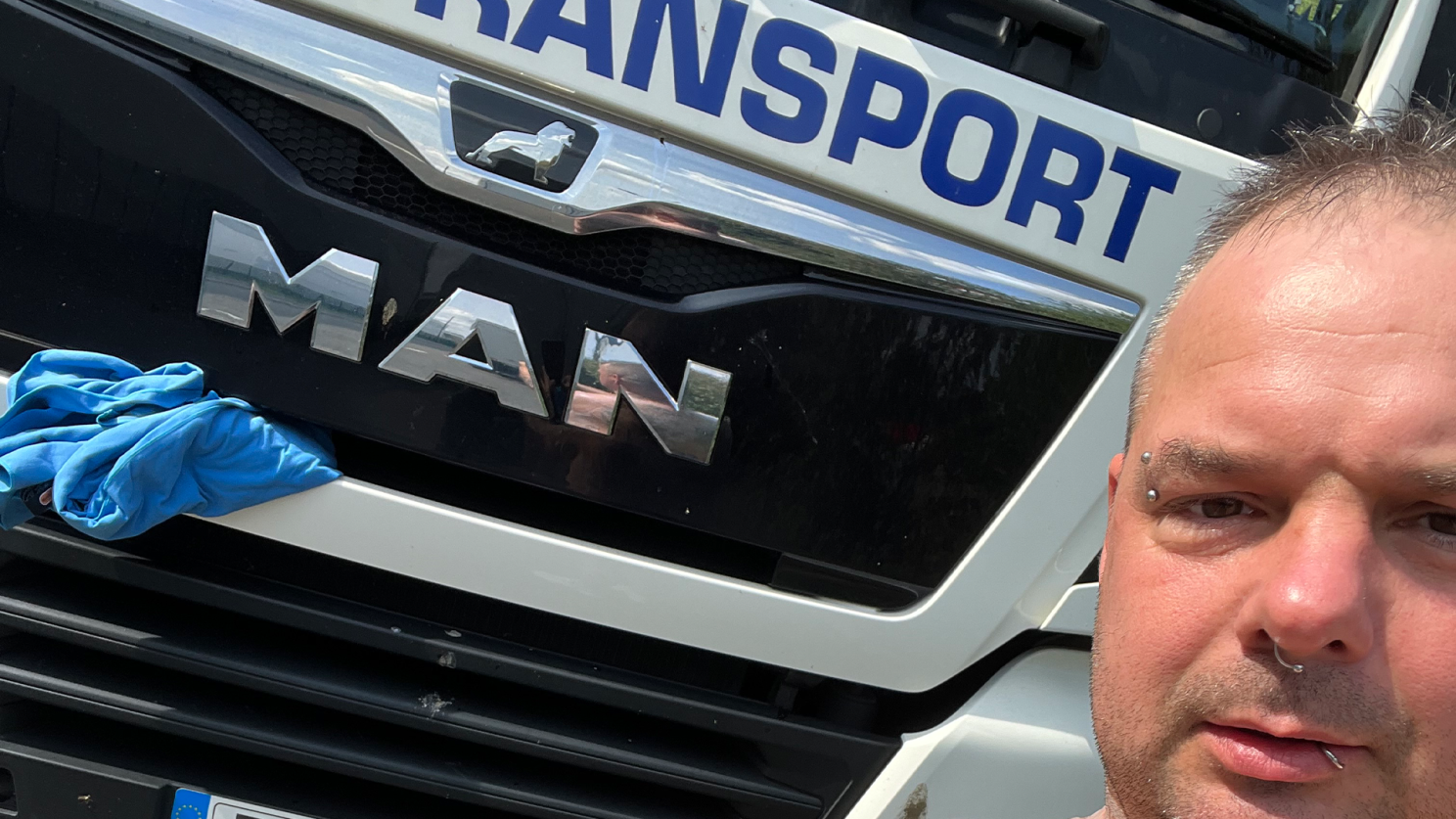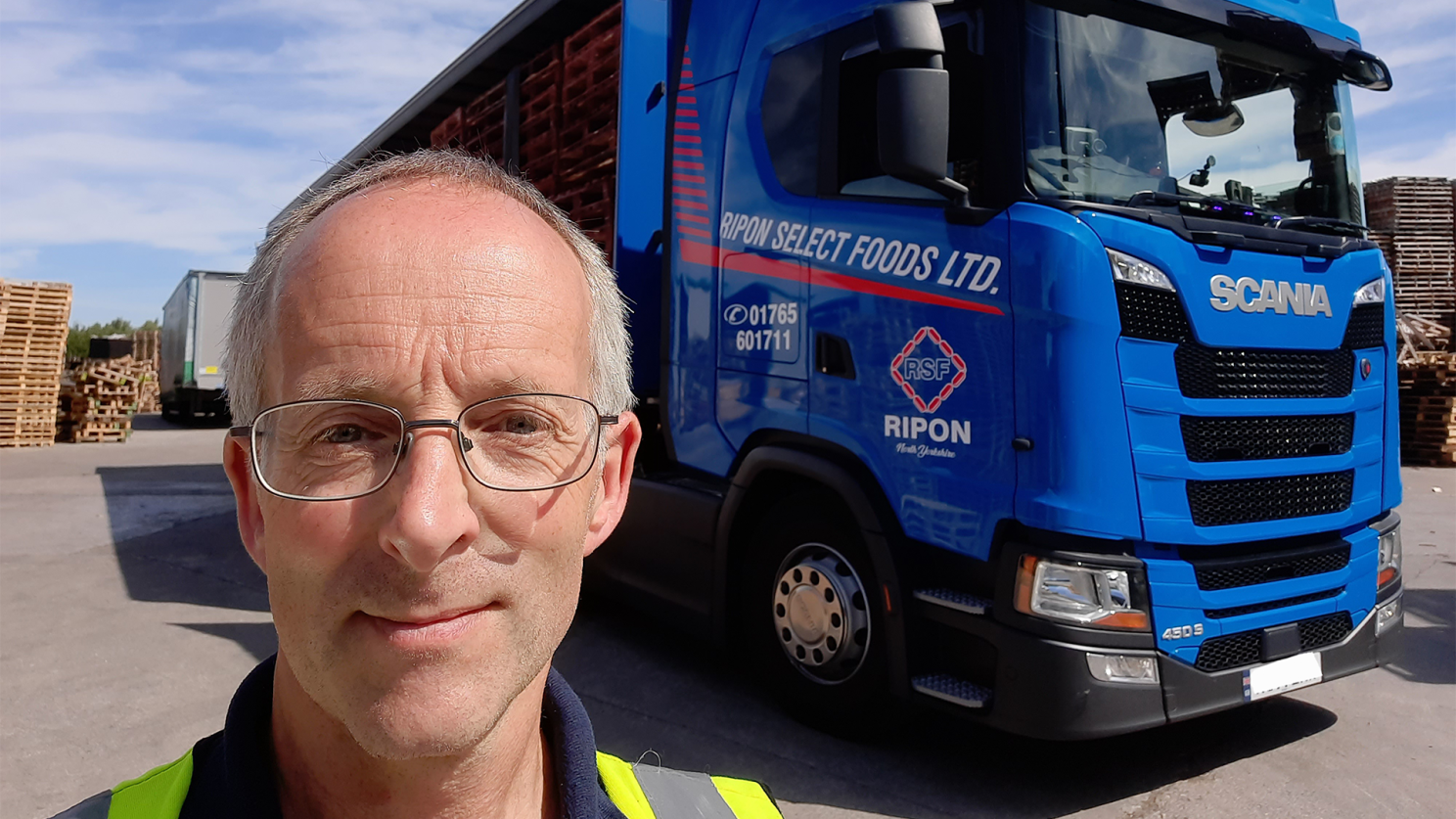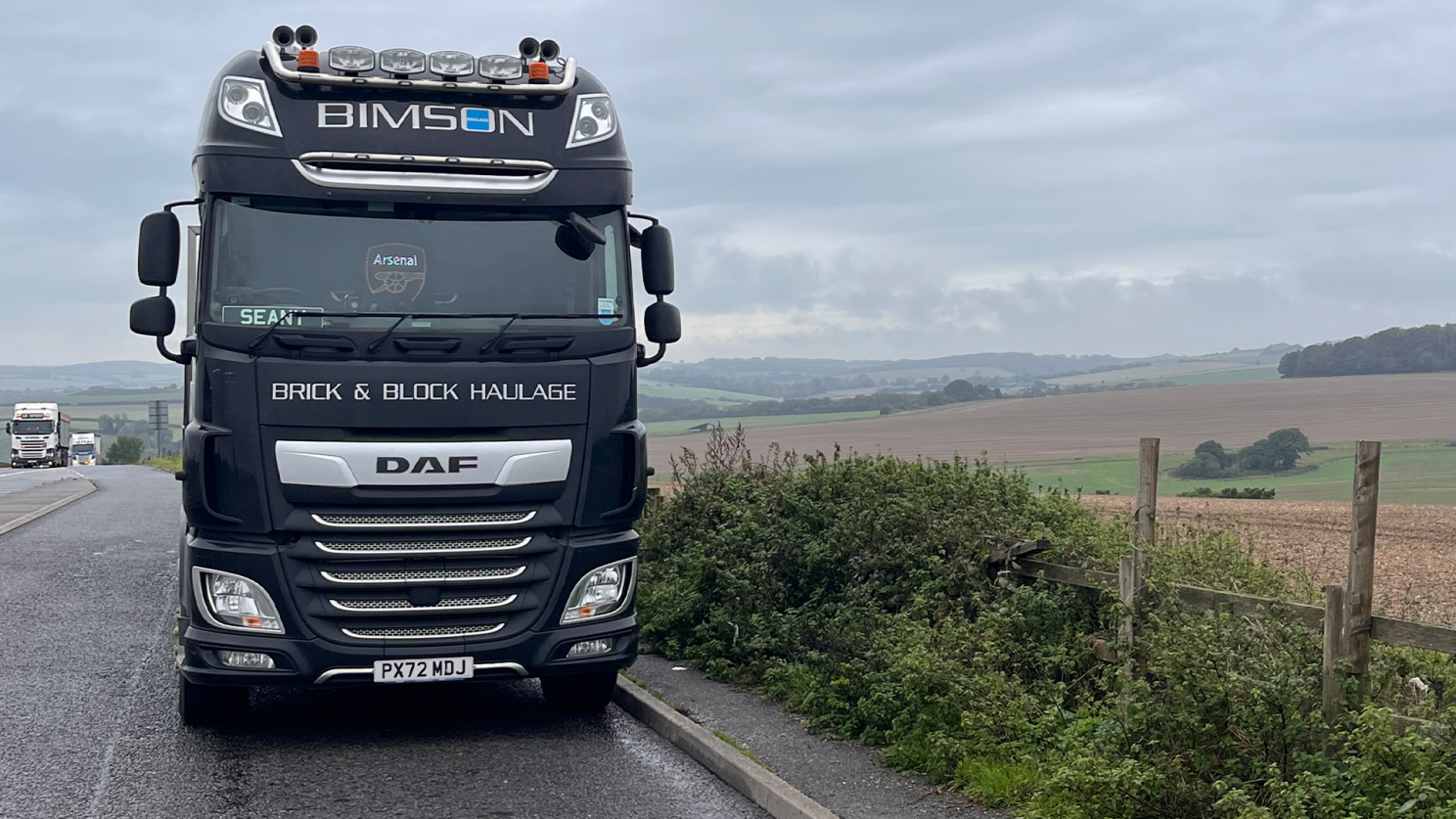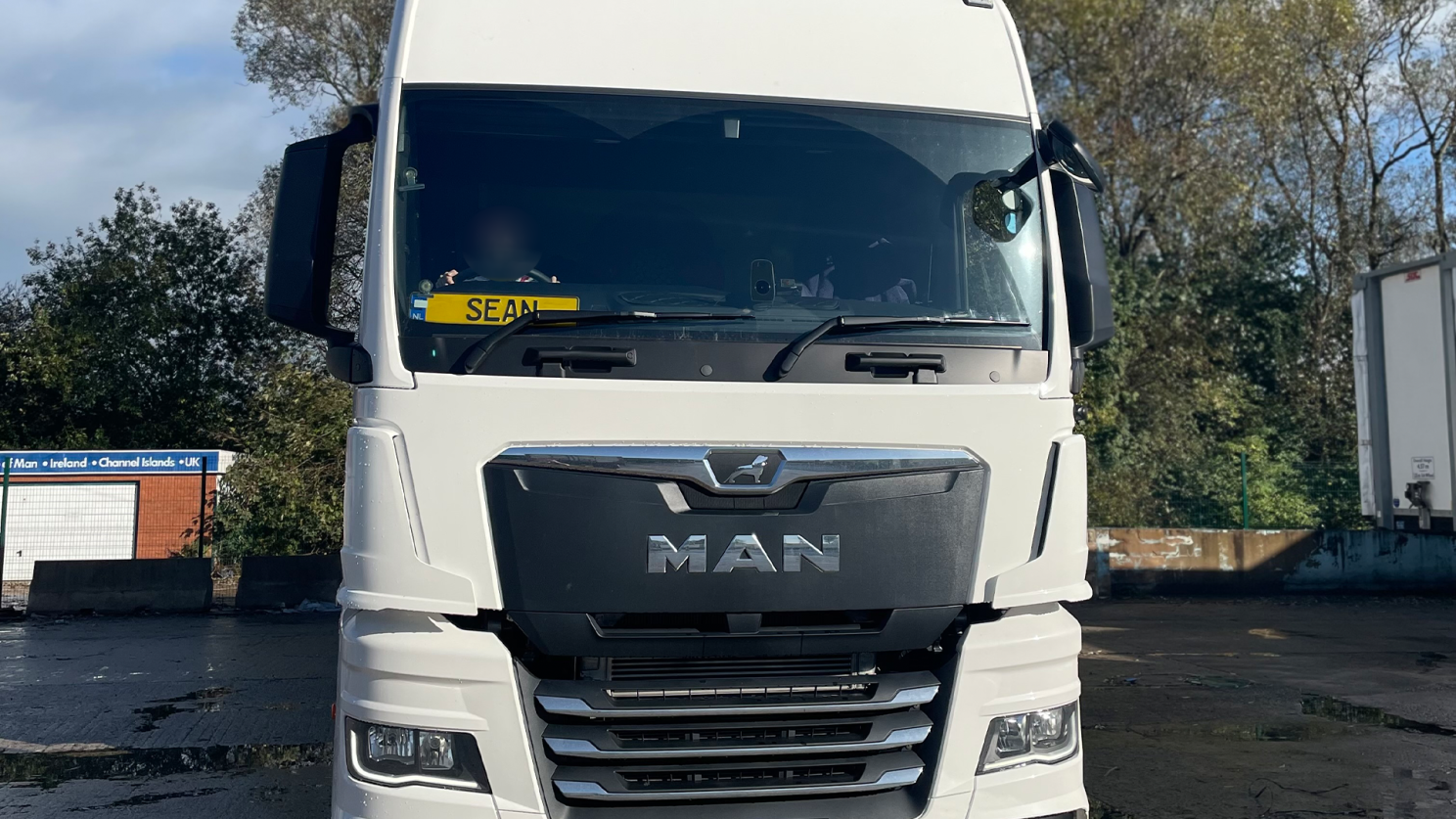
Susie Jones
Cuentos de camioneros: historias de la carretera
Creado: 22/08/2024
•
Actualizado: 22/08/2024
Queremos arrojar luz sobre la comunidad del transporte por carretera y conocer a las personas que están al volante.
Desde helicópteros que aterrizan delante de sus camiones hasta coches que circulan por el lado equivocado de la autopista, conozca mejor a los conductores que le entregan sus mercancías.
Alan
Alan conduce desde hace 23 años y decidió unirse al sector después de escuchar las canciones de Ally Thomson sobre conducción de camiones. Cuando se le pregunta qué es lo que más le gusta del trabajo, afirma que es "la soledad que aporta la conducción de camiones: hay una separación total de la vida doméstica."
Los camiones Volvo son sus favoritos, ya que viaja por todo el Reino Unido transportando mercancías de Amazon. Dice que ha transportado montones de productos interesantes, "la elección es ilimitada, basta con pensar en cualquier cosa que venda Amazon".
Para los conductores que aparcan por la noche, entretenerse durante el tiempo de inactividad es difícil. Sin embargo, los conductores experimentados como Alan han conseguido que su rutina nocturna sea perfecta. Afirma que "le gusta ver Sky TV a través del iPad" cuando está aparcado por la noche.

Para los conductores que luchan por mantenerse entretenidos al volante, hemos recopilado una lista de formas de evitar que el aburrimiento haga acto de presencia.
Aunque las largas horas en la carretera pueden parecer monótonas para muchos, Alan explica que siempre hay algo que le mantiene alerta.
"Creo que lo más loco que he visto conduciendo es un helicóptero aterrizando justo delante de mí", explica, muy lejos de la monótona reputación que ha envuelto al sector durante décadas.
Con 23 años de experiencia en el sector a sus espaldas, Alan nos ofrece algunos consejos que mantendrán tus perlas blancas frescas durante tus viajes.
Explica que "el consejo que daría a cualquiera que se inicie en el sector es que recuerde siempre tener el cepillo de dientes cargado".
Richard
Hace 36 años, Richard empezó su carrera en el sector del transporte y nunca miró atrás. Le picó el gusanillo de conducir cuando se unió a sus dos hermanos mayores para ayudar a repartir mercancías por todo el Reino Unido.
"Me encanta coger una carga y ponerme en marcha. Puedo decidir cuándo hago una pausa y dónde aparco. Estar en la carretera y viajar por todo el Reino Unido es genial", explica.
Durante su carrera, la vida en la carretera le ha llevado hasta Milán (Italia), un viaje agotador incluso para los conductores más experimentados. Cuando se le pregunta cómo se entretiene en sus viajes, afirma: "Me gusta escuchar música y ver películas en los ratos muertos."

¿El mejor camión para hacerlo? "Tiene que ser un Scania Next Generation 450S", afirma.
Para Richard, 30 años en el sector no han estado exentos de historias disparatadas y entregas insólitas: "He visto un coche ir en sentido contrario por una autopista, saliendo de una vía de servicio. Lo más interesante que he tenido en la parte trasera del camión es una carroza del desfile de San Wilfred".
Aunque le sigue encantando la carretera, Richard afirma que a veces tiene un precio. Ofrece una gran perspectiva de la realidad de esta profesión y consejos para quienes quieran unirse al sector.
"Piensa muy bien si ésta es la carrera adecuada para ti. Prepárate para largas jornadas y para perderte mucha vida familiar".
Sean
Crecer en una familia de conductores significa que Sean lleva el transporte por carretera en la sangre, y hace 20 años se puso al volante y siguió su carrera en el sector del transporte.
El trabajo tiene muchas ventajas, pero a Sean lo que más le gusta es la libertad que le ofrece. Esta libertad le ha llevado hasta Escocia para realizar un servicio cada seis semanas. En esos largos viajes, llamar por teléfono a los amigos y ver la televisión son su fuente de entretenimiento.

Además, las paradas de camiones han desempeñado un papel fundamental para Sean a la hora de combatir el aislamiento que supone conducir. A menudo un hervidero de actividad, las paradas de camiones permiten a Sean ponerse al día con sus amigos en sus viajes.
Estas paradas en boxes son la oportunidad perfecta para escuchar las locas historias de otros camioneros. Al igual que Richard, lo más extraño que Sean ha visto en sus viajes ha sido "un coche que iba en dirección contraria por una autopista en la oscuridad", una historia demasiado común entre la comunidad de camioneros.
Un DAF XF 530 es el camión elegido por Sean para transportar materiales de construcción por todo el Reino Unido. Aconseja a cualquiera que busque una carrera en el transporte por camión que "¡simplemente vaya a por ello!".
Dave
Dave lleva 30 años conduciendo camiones y ha viajado hasta Dinamarca y España. Cuando no está viajando en su camión favorito, un Volvo FH, le gusta ver telenovelas en la comodidad de su cabina.
"El comportamiento de algunos conductores me ha dado algunas historias locas que contar", explica. Sin embargo, cuando le preguntamos qué es lo más interesante que ha llevado en la parte trasera de su camión, Dave no nos dice nada: "es un secreto", afirma.
Después de 30 años transportando mercancías, Dave ha aprendido algunas cosas sobre el mundo del transporte. Ofrece un gran consejo a quienes buscan iniciar su carrera en el sector: "asegúrate de especializarte en algo".
Alastair
Relativamente nuevo en el sector, Alastair decidió dedicarse a la conducción de camiones para mantenerse ocupado tras su jubilación. Con cinco años a sus espaldas, lo que más le gusta es la variedad de la profesión.
Durante este tiempo, Alastair ha podido viajar por todo el Reino Unido y Europa: "He viajado a Inverness, Copenhague, Lisboa, Budapest y Roma", afirma.
Para no aburrirse, a Alastair le gusta escuchar "Radio 4, LBC y 5 Live".
Viajando por Europa, ha sido testigo de comportamientos inusuales por parte de otros usuarios de la carretera. Sin embargo, fue más cerca de casa, donde tuvo que maniobrar con su camión a través de "las manifestaciones de Londres". Fue probablemente lo más loco que he vivido", explica.
Para los fans de 007, Alastair comparte el momento en que tuvo que transportar algunos objetos de alto secreto.
"Lo más interesante que he tenido en la parte trasera del camión serían probablemente objetos de exposición de James Bond", afirma.
Aunque Alastair no lleva mucho tiempo en este sector, tiene algunas palabras para los nuevos.
"Un consejo que daría a alguien que esté pensando en incorporarse al mundo del transporte es que mantenga la calma".
Sean V
El amor de Sean por la carretera se remonta a las muchas vacaciones de verano que pasó con su padre viajando en su camión. Después de 30 años conduciendo, su amor por la carretera sigue creciendo.
"Lo que más me gusta de este trabajo es ver todos los sitios bonitos del Reino Unido y Europa", explica. Es un trabajo que le ha llevado a varios destinos: Roma es el más lejano al que ha viajado.
Cuando no está explorando los pueblos y ciudades, a Sean le gusta entretenerse viendo la tele, utilizando su iPad y, hasta hace poco, jugando en la comodidad de su propio taxi.

¿Lo más loco que ha visto en la carretera?
Desgraciadamente, Sean es otro de los testigos de un espectáculo demasiado habitual entre los camioneros: "un coche circulando en sentido contrario por la autopista", explica.
Durante los 30 años de carrera de Sean, afirma que los camiones DAF han sido sus favoritos para conducir, y que el artículo más interesante que ha transportado ha sido "equipo médico especializado".
El amor de Sean por el sector supera algunos de los aspectos negativos del trabajo. Sin embargo, para aquellos que quieran iniciar su carrera en el sector del transporte, Sean tiene estas sabias palabras:
"Si está pensando en incorporarse al sector, espere hacer muchas horas".
Regístrate hoy en SNAP
SNAP le facilita la vida conectándole con nuestra amplia red de servicios de transporte por carretera. Inscríbase hoy mismo


